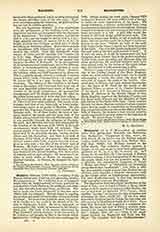

McMahon, MARTIN THOMAS, soldier, jurist; b. at Laprairie, Canada, March 21, 1838; d. in New York, April 21, 1906. His parents took him to the United States when he was three weeks old and eventually settled in New York. He attended St. John’s College, Fordham, where he was graduated in 1855. To study law he went to Buffalo, thence as a special agent on the post-office to the Pacific coast and was admitted to the bar at Sacramento, Cal., in 1861. When the Civil War broke out he raised the first company of cavalry of the Pacific coast, but resigned its captaincy when he found it would not go to the front and went east to Washington where he was appointed an aide-de-camp to General McClellan. He served with the Army of the Potomac all through the war, and at its close had attained the rank of brevet Major-General of Volunteers. For bravery at the battle of White Oak Swamp he received the medal of honor from Congress. In 1866 he resigned from the army and was appointed corporation counsel of New York City (1866-67) and then was sent as Minister to Paraguay (1868-69). On his return he practiced law until 1881, he was made Receiver of Taxes, U.S. Marshal, State Assemblyman and Senator. In 1896 he was elected Judge of the Court of General Sessions which office he held at this death.
His brothers, John Eugene, and James Power, were also lawyers and soldiers and both held the command as colonels of the 164th New York Volunteers during the Civil War. John was born in Waterford, Ireland, in 1834, was educated at St. John’s College, Fordham, and died at Buffalo, New York, in 1863, from injuries received in the army; James was born in Waterford, 1836, and was killed while leading his regiment at the battle of Cold Harbor, Va.
THOMAS F. MEEHAN

